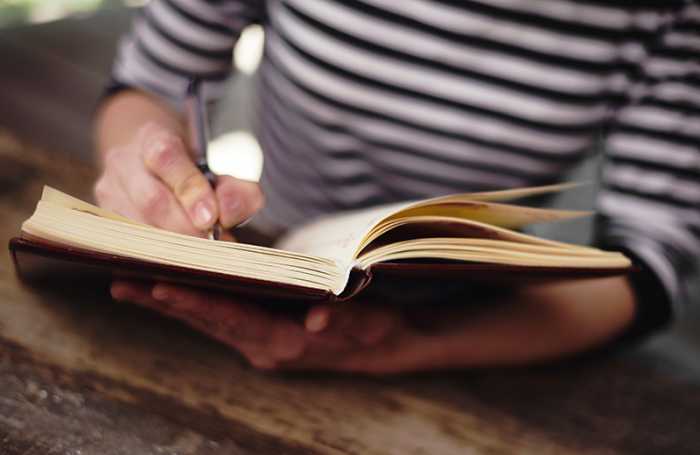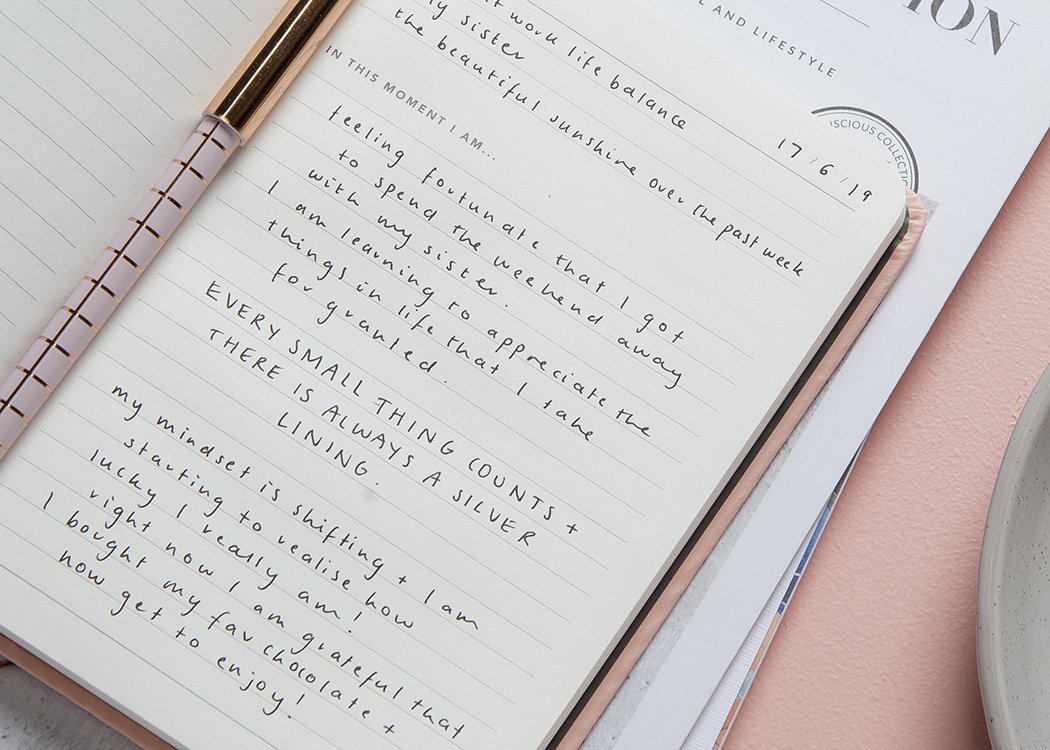The Impact of Writing on Well-Being and Self-Development

Creative writing is known to serve as entertainment. When a piece of fiction is written, it is usually created for others to read, as the writer often hopes the reader will derive something of significance from their work. While sharing work and creating pieces for the public is important, right now, the focus should be on writing for oneself. With the increasing amounts of stress due to COVID–19, and the unexpected turmoil it has produced, everyone should be reaching for a sheet of paper and a pen. Having a journal to document experiences and feelings can help ease current anxieties and strengthen the mind. Writing has proven to provide numerous benefits for mental health, and this is through both journaling and creative fiction. Many well-known celebrities have experienced the benefits of journaling firsthand, and continue to keep steady with their practices. While it seems like it may be a tedious activity, it is easy to become absorbed in the cathartic process and grow fond of the emotional release. From journaling for mindfulness, gratitude, or writing creative fiction, the boundaries are limitless but the impact will be significant.
Journaling for Mindfulness
Journaling does not need to be a redundant or lengthy process. In fact, journaling is something that can be done for just 15 minutes a day. It’s not about how much you write; it’s about adhering to the practice and trying to build a habit of doing it everyday. It should become part of a routine. It can be a morning activity performed after that first cup of coffee, or it can be a calming process at night to end the day on a positive note. Journaling is unique to each individual. A question some people may have: What should I write about? Well, once again, this differs for most. However, the mindfulness approach to writing consists of writing in the present moment and staying connected to what is going on right here, right now. It is essentially a stream of consciousness. There should be no consideration of what sounds good or what would be more politically correct.
A key thing to remember is that only the writer will be the reader. The journal belongs to whomever writes in it, so there should be no worry that anyone will be reading its contents. Write about feelings, struggles, hopes, worries, or fears. By being present in the moment, the writer has a chance to both recognize and process their feelings. Some emotions may be festering subconsciously, but they are unknown until provided the opportunity to sit with the mind and uncover its thoughts. This can be an extremely therapeutic process, as it is the divulging of emotions, thoughts, and feelings that need to rise to the surface. In some ways, it can be more beneficial than confiding in a person, as there is no need to refine or hold back any thoughts or opinions. The most important part of journaling for mindfulness is honesty. The only way to see prominent improvement is to be honest with oneself and acknowledge all feelings, good or bad. Set aside time once a day to be true to the mind and its emotions, and the ways in which it can alleviate anxieties and release stress will be both noticeable and beneficial.

A Gratitude Journal
Gratitude journaling is another great exercise that doesn’t even need to be performed daily. With this type of journal, it is perfectly alright to make entries twice or three times a week, as long as there is a weekly effort. Many people choose to dedicate a whole journal to expressing their gratitude, allowing for them to appreciate and give thanks for their blessings. Sometimes, people encounter challenging hardships, and it simply feels like everything is falling apart. It is a hopeless, painful feeling, but gratitude journaling should serve to remind people that there is still always something to be thankful for. In these unprecedented times, dealing with the virus and its emotional and physical impact, it is important to be mindful of the fact that there are still things to appreciate. Gratitude journaling doesn’t need to be a page-long list; maybe one day it’s just about being thankful for that nice, steaming cup of tea. Once again, there are no rules or restrictions. Everyone expresses gratitude and appreciation in a unique way. The gratitude list doesn’t even need to be a list. Perhaps taking photos of things that evoke gratitude and pasting them in a notebook is how someone chooses to express their thanks: anything goes.
It’s also okay to be thankful for something that had a negative outcome. Maybe there has been a personal negative situation that ended poorly, but the result was a positive one. Positive lessons can be derived from negative situations, and the resulting wisdom can be something which evokes gratitude. Feel free to be detailed about the source of appreciation. In this case, it’s definitely about quality over quantity. Elaborate on each item and be specific about why it evoked gratitude. The only way a gratitude journal will work is if there is an active decision to be thankful and acknowledge each blessing. Expressing gratitude becomes part of a lifestyle, and it is something each person must want before they can have it. Taking up a gratitude journal means there is a decision to be happy, and that’s a great first step.

Fiction as an Outlet
Currently, everyone is desperately waiting to return to the real world. The monotony of quarantine can often be upsetting, but if citizens can’t experience eventful extravaganzas, their characters can. This is not to say that a writer needs to live vicariously through their characters, but it is certainly alright to indulge characters in events that people can’t experience at this time. If it’s amusement parks that someone misses, they could write in detail about them, as if they were there. Describe the feeling of being on a rollercoaster, the smell of hot pretzels, the taste of pop on a scorching day. With both journaling and creative fiction, it is important to not shy away from detail. By immersing a character in a world that is missed, pieces of it can be kept alive through writing, until quarantine ends and the experiences are possible. Recounting detailed events as if they were lived can help fill the voids of all that is missed.
The Benefits of Creative Fiction
Fiction-writing has numerous benefits that can positively impact day-to-day life. Creative fiction can help build better self-image, as writing allows oneself to develop opinionated ideas and unique perspectives. Through creating stories, confidence can be built, due to the empowering freedom that comes with being in such control. The writer has control over the setting, their characters, and the plot, which can promote firmness in decision-making. It can even strengthen communication skills. As a person writes, they start to understand how they wish to phrase things and what exactly they mean to say. This helps to structure thoughts, opinions, and arguments, all of which are advantageous in the real world. Many times, a piece of fiction is written, and the writer subconsciously draws from personal experiences. As they write, they may not realize it, but they tend to incorporate aspects of real-life people and situations. This can serve as a form of catharsis, due to the fact that certain events and people can be addressed without actual confrontation. Thoughts, feelings, and emotions can be recognized, and opinions and outlooks can be expressed. Creative fiction is a form of self-expression, because the writer has the ability to do things they might not get to do in reality; writing about them can be a good alternative.
A General Journal
While different forms of journaling and writing have been suggested, this doesn’t mean that journals need to be exclusive to specific categories. If a separate journal for each is desired, that is perfectly normal. However, it’s also great to have a journal that can be used for anything: a general journal. Mindfulness journaling is great because it is about staying in the present moment and gratitude journaling serves as a reminder of blessings and invites positive, thankful energy. These are great things to welcome into journaling practices, but it is also good to have a fun space for writing. Perhaps instead of journaling, one wishes to write poetry. Creating sketches for an entry, scribbling song lyrics, writing personal stories, or whipping up fanfiction are all healthy forms of self-expression. Writing does not need to be specific to a category. The most important part is the writing itself. There shouldn’t be any pressure or restrictions; create what feels natural.
More Incentive to Get Started
If the benefits surrounding writing aren’t convincing enough, perhaps the celebrities who have found therapy and healing through journaling will be of persuasion. These stars that many people idolize include Jennifer Aniston, Lady Gaga, Emma Watson, Jessica Simpson, and Joseph Gordon-Levitt. Aniston uses her journal to dissect various relationships and aspects of work. Using a journal is her way of dealing with relationship issues, without having to engage in verbal disagreements. Lady Gaga likes to document everything in her journals as she tours the world. Her journal contains her thoughts and feelings, and it even includes sketches, photographs, and letters. Emma Watson has kept diaries and journals for many years, an indication that she has been privy to their advantages.
Jessica Simpson finds journaling to be extremely therapeutic, as her journals include themes of heartbreak and perseverance. She draws from her journal excerpts, using them as inspiration for her albums. Jessica’s journal is a great example, as it shows the many ways in which a journal can be used, such as for work or other creative projects. Finally, Joseph Gordon-Levitt keeps a journal and admits that he goes through phases where he uses it more and phases where he uses it less. Sometimes, day-to-day life can interrupt the process of journaling, and that’s okay. It’s just important to return to the practice. Joseph Gordon-Levitt especially enjoys journaling when he needs to work through something that has been of distress. Journals can be personalized to accommodate to everyone’s needs, and it is important to begin the process, in order to discover the ways in which it can be of personal advantage.
“I don’t know what it is. I’ve always kept and collected things, and I’ve always been interested in the idea of diaries. I must have 10 different personal diaries: I keep a dream diary, I keep a yoga diary, I keep diaries on people that I’ve met and things that they’ve said to me, advice that they’ve given me. I keep an acting journal. I keep collage books.“
— Emma Watson

Overall, journaling has proven to positively impact lives, whether that be through improving the mental state, serving as a form of catharsis, or providing a place to vent, be thankful, or sift through emotions. Fiction is just as advantageous, as it has a host of benefits, some of which are enhancing personal opinions, developing stronger perspectives, and creating a place where experiences can be created or relived. The advantages are unique to each individual, so it’s time to get started and explore the ways in which they can be of help. Journals are a safe-haven, because writers can be authentic to themselves, their beliefs, emotions, and perspectives. Writing is an outlet and a way to enhance the mind, so take advantage of this opportunity to improve upon lifestyles. Everyone can journal and write, as long as they have the will to change their lives.
Works Cited
- Author, Guest. “How Writing Can Improve Your Mental Health.” RTOR.ORG, 12 June 2019, https://www.rtor.org/2019/06/12/how-writing-can-improve-your-mental-health/.
- Studio, Minte. “5 Celebrities Who Keep a Journal.” Medium, 23 July 2018, https://medium.com/@mintestudio/5-celebrities-who-keep-a-journal-a6888bc2a42b.
What do you think? Leave a comment.










Mindful creativity is so good for developing all aspects of thinking! Journaling (and blogging) are really good ways to do that. For me, I am a writer, and also a painter with acrylics and pastels. I love how art helps to open up my increased awareness of what is around me. Writing does the same, in a different way.
I love how you describe it: “open up my increased awareness of what is around me.” So true.
Lovely article. I’m excited to tell you that I finally got my first 5 chapters out to some friends and have heard positive things! I’m trying to take a few days to let my brain rest, but my head is already exploding with inspiration
I find if I write the first draft of a post too analytically my writing is stunted and doesn’t flow very well. Once I turn off the perfectionist part of my brain the writing often flows easily and I am often surprised (positively!) by the result.
While writing you must believe with all your heart that your work is a singular work of genius. When revising you must make every single word justify its existence in the piece. This is why writers are sometimes paralyzed, you really do need to be a little crazy.
Mindfulness is such an important skill for any creative endeavor. When we find ourselves in that state of effortless flow, our spontaneity is heightened, and our imagination has space to run wild.
I have starting writing with my heart and editing with my mind the past few months. I do think my writing has become more interesting and honest. I am a thinker, more than a creator. I can’t force creation, it does come from stillness.
Thanks for this article, especially the part about fiction as an outlet. Fiction has been a big part of my life as long as I can remember, and a part of my career for several years. I’m glad it’s getting some of the attention it deserves as a conduit for good mental health.
As someone who LOVES writing but has only ever written for a specific purpose (an article or uni assignment), this is something to consider. I’ve thought from time to time ‘maybe I should get a journal’ (and that’s usually when I see a journal with a pretty cover in a book store), but I’ve never followed through with it. You have me almost convinced!!
A nice article!
I used to write in journals/diaries all the time when I was younger. Even now, when I don’t write as often (focusing more on fiction), I find writing to be a stress relief and helpful for creativity. It’s also lots of fun!
I’ve been writing for a blog called “What Makes Us Come Alive?” And it’sbeen really rewarding—just reaching new people and seeing reactions from folks you might never meet! Loved this article. Good work, Emma!
Finding inner peace is so hard these days that those who do are truly blessed. There’s just too much chatter around, offline and online, and to make the mind go quiet for even a split second is something that many of us only dream of.
I think one of the ways I get overwhelmed is thinking about how many articles I have to write for the week instead of…one article at a time. Present moment writing. That’s for me.
Thank you for this article. It affirms many ideas I have about writing.
Great read. I have a major problem with motivation, though not so much any more. I’ve started to keep track of my growth as a freelance writer, and following my progress has helped motivate me to keep going.
I’ve found that I’m most productive in the morning. So I’ve been trying to do most of my work in the mornings now before 5pm, rather than later. Starting to write in the morning immediately after my first cup of coffee has helped tremendously. If you’re struggling with motivation or procrastination, I completely recommend finding out the time during the day when you’re most productive. This can only be done if you experiment, but it does help.
I’m struggling with revising my novel. It looks like your mindfulness with writing might help me. If you have anything else for revising, I would really appreciate it. Thank you.
When writing, write. When meditating, meditate. When doing anything, try to do it mindfully. That’s my humble opinion, and my intention. My efforts so far have met with mixed results, but I suppose it will be a life-long project. My all be happy.
I do agree, that’s it’s best to do one thing at a time. But I also think it’s good to be creative and try things out differently and see what happens.
Meditation can become isolated by itself – I’m keen for meditation to spread out to my whole day and influence my activities and relationships. Otherwise, I think meditation becomes just an isolated and mechanical part of my day.
One of the many ways mindfulness helps me is while copyediting or proofreading. Because my awareness is keeping an eye (so to speak) on what my mind is doing (being mindful and alert to thoughts as they flit in and out), I know when I’ve breezed over a sentence without inspecting every word or phrase/clause or “listening” to it properly. I also know I’m capable of reading entire paragraphs, even out loud, without getting the image or picture in my head of what’s going on. And that can mean ignoring errors or opportunities to make improvements. So when I catch myself (usually right away), I backtrack and re-read. Or take a nap.
Mindfulness has totally changed my life.
We write because we have to, at least that’s my story. The act of writing IS a form of mindfulness. ❤
I would love to read an article about dealing with people’s expectations. Should I write for an audience, or for myself? What does it mean to be a successful writer?
This post gives me inspiration for the next time I will write and the way I will write. Joy and writing = 🙂
Excellent article – thanks. I couldn’t have put these points better! Now, I return to my novel writing.
This has given me an idea for a possible creative project I will need to do as part of an M.A. in Myth Cosmology and the Sacred, thanks.
You make a good point about writing as a means of stress relief. Above and beyond that, I find that there’s just something satisfying about getting your own thoughts out on a page. The one roadblock I’ve encountered to fiction writing, especially for writing that’s longer than a couple of scenes, is that it’s hard to sustain for long periods of time without some sort of accountability. It makes me wonder if any online communities have sprung up to share writing, and if the pandemic has made them more popular.
The same way that working out daily is a good way of remaining fit in the long term, writing and reading every day can be useful for becoming more comfortable and proficient in the trade. As long as one relishes the process and doesn’t become too beholden to any particular project they’re working, success shall ensue when they least expect it.
I write to deal with my demons. Doesn’t sound like anyone else here has that problem but I don’t think that’s bad for me. It’s good to know and know of people who aren’t at war with their demons. “The Kids Next Door: Sons and Daughters Who Killed Their Parents,” William Morrow (1985) and “Unspeakable Acts: The Ordeal of Thomas Waters-Rimmer (1993): I think I can use them to dive into creative writing and fiction writing like I dove into journalism. That’s my plan.
I like to encourage my clients to practice positivity journalling alongside journalling as an outlet. By reminding ourselves of positive aspects of our lives we can combat falling into a rut of repetition in our reflections. Some people find that cathartic journalling can feed anxiety or depression by making them feel they have not overcome the same problems that have plagued them time and time again. In these cases, focusing on a positive reflective exercise can be very therapeutic. One exercise I’ve suggested (adapted from a book called “Writing yourself happy”) is to engage with all five senses in a piece of writing about a single word, like serenity or joy, and writing mindfully about whatever that word conjures in the mind.
I really enjoyed this article! I like how in the gratitude part you stated that we have something to be grateful for in negative situations, and I certainly agree. Sometimes we get so caught up in writing about the good and don’t write about the lessons we learn from negative events in our lives. It is a great form of self-reflection and character development. I write every day and have just got into writing spiritual fiction. I have noticed that my characters are doing everything I can not do right now but that is the beauty of writing.
Nicely written article, I really enjoyed it.
I can’t write if I’m unhappy, however, I’ve noticed that the process of writing occupies a more logical, instinctive and productive state of mind.
I am mostly a disorganised creator so ‘journaling’ happens everywhere & anywhere…I spend an inordinate number of hours bringing order out of my chaos.
I completely agree with you that the writer uses their experiences and what they have learned about from real people in their lives to create characters that may in some part represent the characteristics of real people. As an emerging writer, it has been hard to give the character the voice you want it to have and to put the words in its mouth that you want it to say. My problem is that often those words are not good, they don’t always work and they’re not always that simple to create, the way you originally thought you wanted to have the character “say”. I wonder if other writers have this problem? I often think that I do not have enough experience to write, and yet….Thanks for suggesting journaling as a way to develop self and remain in the present (accepting it for what it is).
Thanks for sharing these lovely thoughts! I’m a writing tutor, and I often find students have attached so much fear to the process of writing. Journaling can be a wonderful way to alleviate the pressures of writing to someone else’s standards and re-encounter our own creativity.
Mindful writing can be a method to become more aware of your thoughts. We rarely have time to step back and consider our thoughts judgmentally.
You are absolutely right! Journaling is extremely helpful in many ways. My journal is a mix-mash of mindfulness and gratitude journaling with the occasional additional of a “mini analysis” of the book I have recently completed reading. I feel like my emotions can escape and I can more clearly see what is causing my stress as it is literally written on the page. In regards to my “mini analysis”, I find it extremely satisfying to write what I liked about a book and see where it takes me. Sometimes, it simply ends after a brief recap of my favourite scene or ideas in a novel, but other times it can transform into an impromptu essay which allows me to appreciate a book further and help me remember it for more than just its entertainment value.
Thanks for sharing these insights into journaling. I’ve just started gratitude journaling, and it has provided (so far) a way to close off each day on a positive note. This feels especially important when everything in life is so uncertain. I’m curious about journaling and autoethnography and how this helps people make sense of the world around them.
In his book, Digital Minimalism, Cal Newport recommends journalling to counteract the negative effects of digital overwhelm/constantly using digital media, which seems like excellent advice.
Journaling in general has been so helpful through the pandemic. Living alone and feeling more and more isolated as life shifts online is challenging. You don’t always have someone to talk things over with, even over the phone. Being able to process your life alone and look back at its ups and downs is so special and such a benefit to journaling.
Wonderful article. I was hooked from just the title.
This is a really great article! I’ve found that writing consistently, even if for personal projects that may never see the light of day, is a fantastic way to build a sense of accomplishment. It’s such a wonderful feeling to look back and realise that by writing a few hundred words a day, you can fill a book’s worth of pages in nearly no time.
I agree that everyone should write. It helped so much with dealing with any sorts of trauma, and adding fiction to it can provide ways to help us deal with the trauma or see how things could have been different. Writing helps me deal with situations. It helps me even to deal with what sometimes feels like the monotony of life.
Writing has helped me get through the worst and most chaotic of times in my life. Truly, it is a therapy.
Journalling has absolutely positively impacted my MH, a way of externalising thoughts and creating space between them.